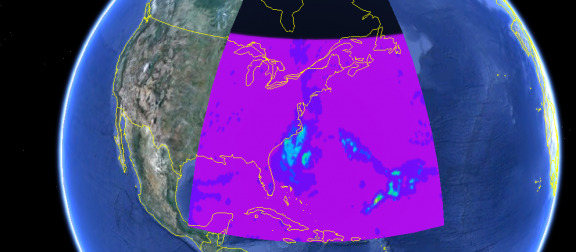
This color-enhanced picture of Hurricane Sandy as it neared the Eastern Seaboard was created by Associate Professor Hesham El-Askary. The bright blue spots are all part of the super storm system.
Those blue-marble satellite images of Earth during a natural disaster are among the most powerful pictures we have whenever a hurricane, dust storm or wildfire strikes our planet.
Most of us turn to newscasts to see them. But as Hurricane Sandy churned toward the Eastern Seaboard, Associate Professor Hesham El-Askary made his own.
El-Askary is director of Chapman University’s Hazards, Global and Environmental Change and Computational Science Program in the Schmid College of Science and Technology. Using data collected from NASA’s satellite images and sophisticated software, he created a color-enhanced picture of Hurricane Sandy as it approached the coast late Sunday, Oct. 28.
In the short term, such pictures help viewers wrap their minds around the magnitude of the super storm.
“I think (Hurricane Sandy) is going to present itself as one of the biggest events in American history,” El-Askary says.
And in the long run they are a small piece in the big puzzle Earth-observing scientists are trying to solve as they study climate change. Chapman’s Earth-observing team has its own satellite for gathering such data in the western regions of the United States — a key to tracking the patterns of fire and dust storms. Some of those archived images can be seen at the Center of Excellence in Earth Systems Modeling and Observations website.
And all the data, from dust storm to hurricane, paint a picture of understanding, El-Askary says.
“You can see the succession of multiple hazards happening, increasing rapidly, not only in frequency but also in intensity,” he says. “It helps us to understand that the world’s climate is changing around us, and that global climate change is a certainty. It is not something that people should be skeptical about.”




Add comment